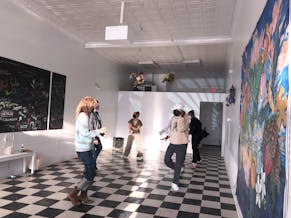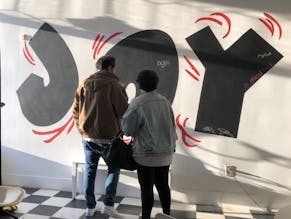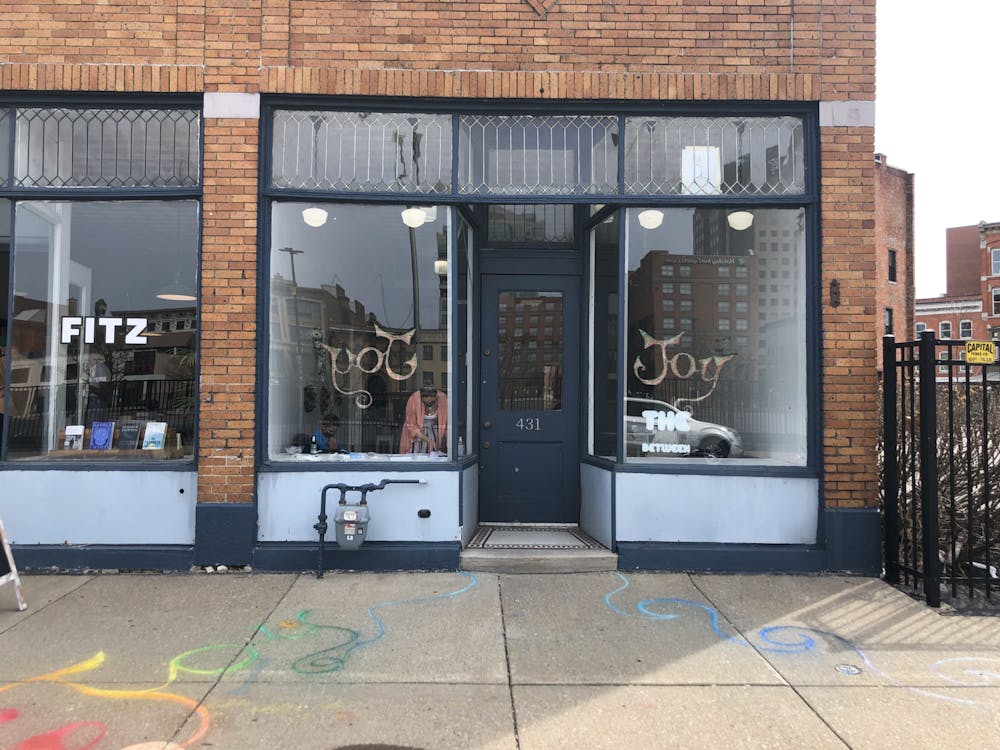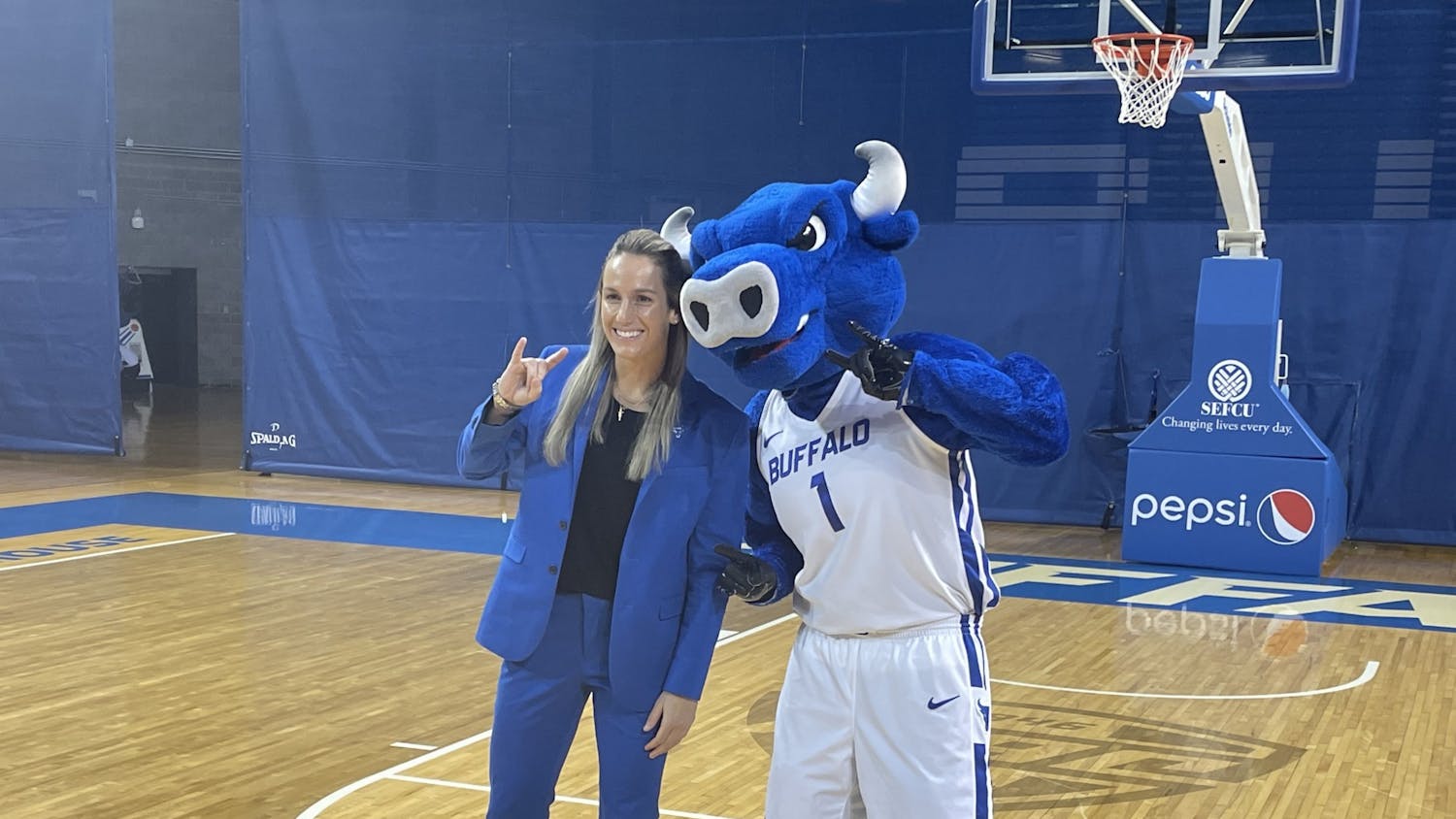The narrow downtown space with the gleaming white walls and checkerboard floor does not look like it belongs to UB.
It looks like an off-beat art enclave, a place for experimenting, far removed from North and South Campus lecture halls, libraries or the bustle of the academic spine. The signage is playful, in exaggerated bubble letters, and, like the website, does not use the classic UB branding font or blue and white template.
Welcome to “The Space Between,” the one-room studio the College of Arts and Sciences has rented downtown for $500 a month to showcase the artistic process. It opened Feb. 27, at a time when galleries and artistic endeavors around the world were struggling to survive amid the pandemic and when most UB departments were facing cutbacks.
The space is run by Bronwyn Keenan, director of the Arts Collaboratory, who insists it is not a gallery.
“It’s a process space,” Keenan said. “It’s the space between the studio and the final gallery, museum or performance venue. It’s where you can experiment, invite in the audience or maybe even start a crowdfunding campaign. It’s meant to be open for people to come and check out the process.”
Located at 431 Ellicott Street, within walking distance to Buffalo’s theater district and CEPA Gallery, “The Space Between” has had two shows since its opening and is part of the CAS Arts Collaboratory (AC), a strategic initiative CAS Dean Robin Schulze began in 2017 to invigorate UB’s connection to local artists and provide opportunities for students in the arts. The space is designed to give artists and the public a chance to interact and watch as art gets created. It has two large outward-facing windows that tease the current project.
In its first weeks, the space attracted close to 80 people, Keenan said.

Located at 431 Ellicott Street, within walking distance to Buffalo’s theater district and CEPA Gallery, “The Space Between” has had two shows since its opening and is part of the CAS Arts Collaboratory.
The space’s rent is being paid through a crowdsourcing campaign that raised $4,645 and attracted 44 donors, said Gina Cali-Misterkiewicz, CAS assistant dean for marketing and communications. The Spectrum was unable to learn the other associated costs of the gallery or how those costs are being paid. “Right now, we see the enterprise as a pop up,” she said.
The Arts Collaboratory had a $542,885 budget from 2019 until the end of 2020, Cali-Misterkiewicz said. Of those funds, $298,079 went to Keenan’s salary ($145,627 for 2019 and $152,452 for 2020), while $16,039 went to “student support,” $12,886 went to “visiting artist fees” and $28,450 was spent on “awards and programming support,” she said. An additional $108,135 was used for “other operating costs.” The Spectrum was unable to learn what the other costs were or if they include additional expenses for “The Space Between.”
Of those funds, $100,000 came from the provost’s office, $398,079 came from CAS and $44,806 came from philanthropic support, Cali-Misterkiewicz said.
The AC had a $79,296 budget going into 2021, Cali-Misterkiewicz said.
The Collaboratory has hired a part-time employee, two freelancers and two freelance photographers — both recent UB graduates — to work in the space, Keenan said.
One of the main goals of the space is to integrate UB into the Buffalo community and to give students exposure to local artists, Keenan said. As part of her job, she says she regularly attends UB staff meetings and collaborates with department chairs.
“Everything we do is engineered to spotlight, educate or inspire UB students. Our goal is to encourage experimentation, collaboration, and exploration,” Keenan said. “We want to help prepare students for the world outside UB, and those are three things most successful working artists share in common.”
The space has limited hours and is essentially open when the artists are present; hours are posted on the website. Admission is free, but attendance is limited by the pandemic.
Spectrum reporters stopped by several times when the space was closed and once when artist Naila Ansari, a UB MFA alumna who is now an assistant professor in Buffalo State’s theater department, worked on a dance piece as eight community members looked on.
Keenan said the effects of the AC and “The Space Between” are diffused throughout the curriculum.
This includes the “Working Artist Lab,” which is an experimental workspace where UB students, faculty and visiting and Buffalo artists are invited to develop new work and collaborate across disciplines for a semester.
During the spring semester, the “Working Artist Lab” has been led by well-known British figurative and abstract artist Cecily Brown, who currently lives in New York City. Since April 16, Brown has been advising seven Buffalo artists and storytellers remotely as they create a mural based on their life experiences. Two of these artists include George Hughes, a UB art professor, and Sara Zak, an MFA student.
The advising process will run through May 21. Then, from June 2-6, “The Space Between” will turn into an art studio and the artists will work together in person. The final project — a two-story mural — will be painted on the Buffalo Academy of Visual and Performing Arts in late June.
Brown’s AC work is done in conjunction with “Artist/City,” an initiative from the NYC Bortolami Gallery which pairs an artist with a U.S. city.
“Bortolami NYC is underwriting the Lab with Cecily Brown to the tune of $43,000,” Keenan said. “She has made a gift to the Arts Collaboratory. As part of the gift, collaboration grants totaling $25,000 have been awarded to UB and Buffalo artists and culture workers who will collaborate with Cecily Brown on the eventual mural.”
Through the “Live Your Art (At Home) program,” the Arts Collaboratory has also begun offering cash micro-grants and honorariums to UB and Buffalo artists who continue to create during the pandemic. Artists are paid roughly $200-$250 — even more for episodic programming — for their work. Submissions to this program are shared on Instagram and IGTV. The weekly arts program “How Now” spotlights artists and musicians from the greater Buffalo area.

“The mission and goals [of the UB Arts Collaboratory] are constantly evolving, and the reason for that is that it’s always about meeting the needs of the community,” Bronwyn Keenan said.
The Arts Collaboratory also developed the Buffalo Arts Calendar for UB and the Buffalo community.
The Arts Collaboratory’s mission statement can be found on the WHO WE ARE page of its website. According to Keenan, the organization’s mission needs to be flexible.
“The mission and goals [of the UB Arts Collaboratory] are constantly evolving, and the reason for that is that it’s always about meeting the needs of the community,” Keenan said. “And when I say ‘community,’ I mean UB and Buffalo because that bridge we are building [between the two] is really important. I think that, especially for students in the arts, it’s important to be out in the world with your peers and forge a sense of community with them. It makes your work better, and it makes you a better human.”
UB’s Theatre and Dance Department has participated in several collaborations with the AC, including the Michael Mwenso residency this fall, which was organized by Keenan and associate theatre and dance professor Maria Horne.
“Several of our graduate students have benefitted from Arts Collaboratory support,” Anne Burnidge, chair of UB’s Theatre and Dance Department, wrote in an email to The Spectrum.
Keenan said that more than 90% of the collaborators are Buffalo-area artists and that there is about a 50/50 balance between UB and Buffalo creators. Visiting artists — like Michael Mwenso and Marlene McCarty — worked with UB students, faculty and staff and in the community, Keenan said.
Keenan sees “The Space Between” as an opportunity to bring the two sides of Buffalo together. The Buffalo-Niagara region is the sixth-most segregated metropolitan area in the country. Because of discriminatory practices such as redlining, Main Street is like a wall that divides the city in half. About 85% of Buffalo’s residents who identify as Black live on the East Side and have historically had fewer services, amenities and economic opportunities than others.
The new space is meant to challenge people’s preconceptions of what an art space is intended to be like and who art spaces are for. Since the artwork is not fully “finished,” it is not for sale. Keenan said she hopes another venue, gallery or organization will pick up the project where it leaves off at “The Space Between.” These other places could either be in Buffalo or outside of the Queen City.
“The Space Between” opened with artist Victoria-Idongesit Udondian’s “Àdápé,” and currently features Ansari’s work, “Creating Space for Joy,” until May 9. Ansari teams up with artist Marquis “Ten Thousand” Burton to help the community engage with the feeling of joy through physical movement, visual art, spoken word and poetry writing. Some of the artwork was also created in collaboration with the artist Tara Sasiadek.
“The whole idea is to create a space where not only us as the artists can perform, but also allows the community to engage with different art formats that express joy. Whether it be through a mural, something they write on the wall themselves or wearing a crown, these many different things can spark a moment of joy,” Burton said. “And hopefully through that, they can start questioning what joy feels like. How can you use joy? How can you equip it throughout your daily life?”
Ansari says she is grateful to have a month-long platform to develop her work.
“You don’t get that very often, particularly in a place where racial lines were created purposefully to separate,” Ansari said.
The UB Arts Collaboratory has also partnered with Aaron Bartley’s neighboring Fitz Books store to encourage visitors to visit both spaces. Guests to “The Space Between” can watch art being made and also visit Fitz.
“There’s a huge overlap between book lovers and art lovers,” Keenan said. “We see the opportunity to introduce our visitors to great books — and offer a great art experience to those who’ve come for the books.”
Keenan believes in paying artists, even just small amounts, for their work. When the pandemic hit, Keenan reallocated the funds the UB Arts Collaboratory raised from the provost, the CAS dean’s office, M&T Bank and local construction company Savarino Companies, from the beginning of April to June, leading to about $30,000 — or roughly $375 per artist — being distributed to about 80 artists in the UB and local Buffalo communities.
In addition to money, Savarino Companies also provides a live work loft at the Cass Gallery at 500 Seneca Street in downtown Buffalo that the AC can use to showcase student work each year. MFA Nicole Chochrek is currently using the space for her project, “Little, Cute & Lasts Forever,” which is running from March 4 to May 31. The project is open for viewing, Monday through Friday, from 9 a.m. to 5 p.m. It is also open on Saturdays by appointment only.
Chochrek says she spent the last two years collecting small pieces of plastic, labeling them based on geographic location and placing them into small display boxes for her project.

The Space Between opened Feb. 27, at a time when galleries and artistic endeavors around the world were struggling to survive amid the pandemic and when most UB departments were facing cutbacks.
“When you see a piece of trash that hasn’t been cleaned but it’s in a pristine display box, what might we consider that we didn’t before? What is the function and the origin? Why am I attracted to these objects?” Chochrek said. “What is the human nature and inclination to want to collect these objects and to control something that is uncontrollable? I hope it’s a start into a conversation about these invincible objects.”
Though the AC focuses on local artists, Keenan is not from Buffalo. Before Keenan joined the UB Arts Collaboratory, she headed special events and special projects at the Metropolitan Museum of Art.
“I really liked the idea of merging my arts organizational background with my interest in social justice and progressive politics,” Keenan said. “I’m a first generation American, and I grew up lower middle class. But now I’m at a certain stage of my life where I can help young people and demonstrate to them that a life in the arts is possible and really cheerlead for them.”
While the UB Arts Collaboratory began before the pandemic, Keenan says the current economic struggles show that new collaborative spaces are needed more than ever.
“The pandemic has been devastating to institutions across the board, but the art institutions have been especially affected. My old employer is talking about selling off works in the collection, which would be a first. Meanwhile, the billionaires have gotten multiple times richer, so where are they? Why aren’t they helping our institutions?” Keenan said. “We’re going to have to build something new. If our institutions are on shaky ground and we want this country to continue to encourage its artists and for us to actually have a robust cultural life, we’re all going to have to save it.”
Lily Smith contributed to the reporting.
Anastasia Wilds is the senior arts editor and can be reached at anastasia.wilds@ubspectrum.com and on Twitter @AnastasiaWilds
Anastasia Wilds is the senior arts editor. She has been writing for newspapers since her junior year of high school, and she has appreciated all forms of art for even longer. When she’s not writing, she is either reading, listening to music, hanging out with her friends on discord or streaming on Twitch.





